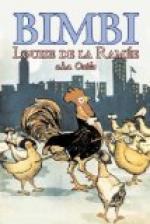the wall and laughed; a Dresden mirror was tripping
about, crowned with flowers, and a Japanese bonze
was riding along on a griffin; a slim Venetian rapier
had come to blows with a stout Ferrara sabre, all
about a little pale-faced chit of a damsel in white
Nymphenburg china; and a portly Franconian pitcher
in gres gris was calling aloud, “Oh, these Italians!
always at feud!” But nobody listened to him
at all. A great number of little Dresden cups
and saucers were all skipping and waltzing; the teapots,
with their broad round faces, were spinning their
own lids like teetotums; the high-backed gilded chairs
were having a game of cards together; and a little
Saxe poodle, with a blue ribbon at its throat, was
running from one to another, whilst a yellow cat of
Cornelis Lachtleven’s rode about on a Delft horse
in blue pottery of 1489. Meanwhile the brilliant
light shed on the scene came from three silver candelabra,
though they had no candles set up in them; and, what
is the greatest miracle of all, August looked on at
these mad freaks and felt no sensation of wonder!
He only, as he heard the violin and the spinnet playing,
felt an irresistible desire to dance too. No
doubt his face said what he wished; for a lovely little
lady, all in pink and gold and white, with powdered
hair, and high-heeled shoes, and all made of the very
finest and fairest Meissen china, tripped up to him,
and smiled, and gave him her hand, and led him out
to a minuet. And he danced it perfectly—poor
little August in his thick, clumsy shoes, and his
thick, clumsy sheepskin jacket, and his rough homespun
linen, and his broad Tyrolean hat! He must have
danced it perfectly, this dance of kings and queens
in days when crowns were duly honored, for the lovely
lady always smiled benignly and never scolded him
at all, and danced so divinely herself to the stately
measures the spinnet was playing that August could
not take his eyes off her till, their minuet ended,
she sat down on her own white-and-gold bracket.
“I am the Princess of Saxe-Royale,” she
said to him, with a benignant smile; “and you
have got through that minuet very fairly.”
Then he ventured to say to her:—
“Madame my princess, could you tell me kindly
why some of the figures and furniture dance and speak,
and some lie up in a corner like lumber? It does
make me curious. Is it rude to ask?”
For it greatly puzzled him why, when some of the bric-a-brac
was all full of life and motion, some was quite still
and had not a single thrill in it.
“My dear child,” said the powdered lady,
“is it possible that you do not know the reason?
Why, those silent, dull things are imitation!”
This she said with so much decision that she evidently
considered it a condensed but complete answer.
“Imitation?” repeated August, timidly,
not understanding.
“Of course! Lies, falsehoods, fabrications!”
said the princess in pink shoes, very vivaciously.
“They only pretend to be what we are!
They never wake up: how can they? No imitation
ever had any soul in it yet.”




